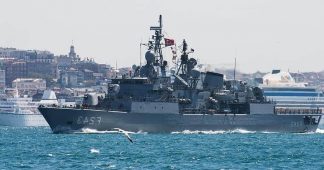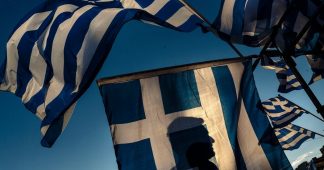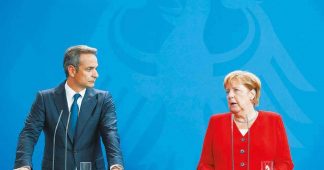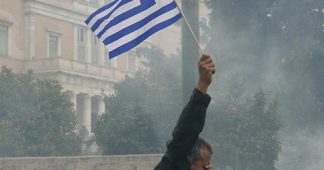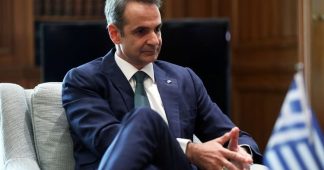By William Mallinson
Charalampos Tsitsopoulos
12 April 2021
Ever since the official founding of the field of International Relations, a perennial debate has been raging at a constant volume. This debate has for the most part assumed the form of an exchange between those who stress power as the primary element (the realists) and those who see institutional co-operation and/or ideas (the idealists or functionalists) as a more apt starting point for comprehending inter-state relations. It can hardly be questioned that both schools provide significant insights. Yet in most Western academic circles, a novel development has been taking place after the fall of the Berlin wall: the new realities mirroring the unequal distribution of power, the differing ambitions of states and how these ambitions are pursued, all within the context of a highly asymmetrical world, are being almost universally discarded as mentally inconvenient, in favour of an expedient and slothful approach befitting a mental state of wishful thinking , rather than reflecting a mentally rigorous scholarly attempt to analyse inter-state relations. Fulcrums of the above development are themselves now the various so-called ‘think tanks’, most of which put forward policy suggestions and ‘positive agendas’ and are generally more audible -and more accessible to the echelons of power- than their more independent but rigorous academic brethren.
Theoretically, ‘think tanks’ are meant to be independent and promote freedom of expression. The Hellenic Foundation for European and Foreign Policy (ELIAMEP) claims to be ‘an independent, non-governmental, nonprofit think tank, established in Athens, Greece, in 1988. Its mission is to ‘conduct policy-oriented research and provide policy makers, academics and the public at large with authoritative information and substantiated policy recommendations, to contribute to the development of evidence-based responses to major European and foreign policy challenges.’ About half its funds come from the European Commission, a third from the Greek and overseas private sector, and the rest from Greek private foundations, embassies and NATO. It can serve as a useful stepping-stone for thrusting young international relations academics who work/write for it. One such is Athanasios (‘Thanos’) Dokos, who progressed through ELIAMEP and the position of Secretary General to his current position as national security advisor to the Greek Prime Minister.
The revered – and feared by the corrupt – Wikileaks has just revealed that in 2010, the Secretary General of ELIAMEP, Athanasios Dokos, privately emailed an as yet unpublished ELIAMEP working paper on Turkish foreign policy to the Turkish Embassy in Brussels, before it was published. It was written by Ioannis Grigoriadis, who teaches at Bilkent University in Turkey. What was so important that it had to be sent before publication, thus giving the Turkish embassy an unfair advantage over other readers of the document?
The paper’s conclusions and policy recommendations say it all: ‘Turkish foreign policy needs to give a new impetus to Turkey’s EU accession, which has abated since 2005. This can help resolve Turkey’s crucial domestic conflicts, namely the Kurdish question and the confrontation between Islamists and secularists. As the European Union is uniquely poised to facilitate this process, Turkey’s EU membership becomes crucial and cannot be treated as only one of Turkey’s strategic options. European authorities should make it clear that Turkish aspirations to a leading regional and a global strategic role are not incompatible with EU membership under the condition that Turkey fully complies with the membership criteria. In fact, a Turkey which enjoys an upgraded strategic position and cordial relations with its Middle Eastern neighbours will be a more appealing EU member state and an asset in European strategic planning.’
This accords well with US, British and NATO policy, but certainly not with France’s, for example, whose late former president Giscard d’Estaing said that Turkish membership would mean the end of the Union, using similar arguments to that of the British ambassador to Turkey in 1977: ‘Leaving aside Istanbul and Izmir and the Aegean littoral, for my money Turkey is more of the Near East and Asia than Europe. Not just physically, with 97 per cent of its territory in Asia, but temperamentally. […] Perhaps this deliberate cultivation of a Western outlook, with all that it means in education, has led the ruling circles and intellectuals and industrialists to regard themselves as truly European, and Turkey in general as Western. […] There is no natural reason why the Turks should be so insistent on their European connexion. […].’ Plus ça change!
Greece does not dare to adopt the Macron line, perhaps understandably, since its membership of NATO theoretically protects it from NATO’s imagined enemy, Russia, although not from fellow member Turkey, with its threats and sabre-rattling, the termination of most of the remaining Greek presence in Turkey in the mid-Sixties, the illegal occupation of Cyprus, claims on Greek territories, and the Imia affair et al. Supine Greek governments nevertheless officially support the US’s and UK’s obsession to get Turkey into Europe. ELIAMEP also takes this supine party line.
There is nothing wrong in principle, of course, with labouring for closer European-Turkish c-operation. But given the all-encompassing and at best vague scope of the paper’s suggestions, certain important questions arise: a) how can Turkey’s regional and global aspirations be compatible with EU membership, given that the road to Turkey’s geopolitical upgrade (i.e. its transformation into a maritime power) entails, and has always entailed, the geopolitical maiming of EU members Greece and Cyprus? Surely the two authors of the working paper were aware that at the time, the occupation of Cyprus and the casus belli against Greece in the event of the latter’s legitimate extension of its territorial waters were in full swing and showing no signs of being dropped; b) what exactly does ‘European strategic planning’ mean in the case of the Middle East? Can the hard-nosed neo-liberal adjustments that the EU collectively pushed for in Syria at the time be considered an example of a well-thought-out strategy? Had Europe developed any ‘strategic planning’ towards Iraq, at the time suffering under foreign boots? Did the German and French views of a potential Turkish accession coincide to such an extent that justified ‘EU strategic planning’? And what does it imply about the intellectual clarity and scholarly veracity of the mentioned scholars, who appear to have been building for so long epistemological arguments on the basis of what seems to be a barely existing ‘strategy’? The questions seem be answer themselves.
Apart from the working paper’s conclusions, it quotes the then Turkish Foreign Minister Ahmet Davutoglou as stating: ‘By 2023 when the country will commemorate the 100th anniversary of the foundation of the republic, I envision a Turkey which is a full member of the EU after having completed all the necessary requirements, living in full peace with its neighbours, integrated with neighbouring basins in economic terms and for a common security vision, an effective player in setting orders in regions where our national interests lie, and active in all global affairs and among the top ten economies in the world.’
This was of course a pipe-dream, but must have pleased the Turkish government.
ELIAMEP’s board of directors includes Alexis Papahelas, also managing editor of Kathimerini, and well known as an apologist of US foreign policy and NATO, unlike the likes of President Macron of France, who has called the latter ‘brain-dead’. ELIAMEP represents, atavistically, those who supported Churchill and General Scobie: they are the ‘moderately dressed’ anti-Russian children of the Cold War, bending over backwards to keep in with the US and British embassies. Good at PR, they downplay criticism of the US and NATO.
ELIAMEP can be a useful platform for persuasion. For example, in October 1999, former British Foreign Secretary David Owen, financed by the Trilateral Commission, was wheeled out to explain to an audience of starry-eyed Greek IR students, diplomats, academics and journalists, why it had been necessary to bomb Yugoslavia. The meeting was chaired by the British ambassador, David Madden who, three years later, just before the illegal attack on Iraq, explained to an audience of students at New York College how ‘we the forces of good’ must intervene, thereby reducing himself to a propaganda tool, just as ELIAMEP serves as a NATO mouthpiece for the unruly Greeks.
The above-mentioned email to the Turkish embassy could be just the tip of an iceberg. Who knows what other serious indiscretions may have occurred? And more worryingly, how would Dokos now handle secret Greek state documents?
George Pagoulatos, a professor at Athens University of Economics and Business, has taken over from Dokos. It is to be hoped that under his tutelage, ELIAMEP will encourage free and serious debate, and become more academically rigorous, if it wishes to be taken seriously, rather than be a NATO mouthpiece, and a harbour and stepping-stone for embedded party-political designer academics. In the long tradition of thinking about inter-state relations, the legacy of E.H. Carr stands out as an apposite warning of what ensues when wishful thinking overwhelms one’s ability to think pragmatically. More recently, Philip Cunliffe of the University of Kent has resumed work on this tradition, in the same vein, calling IR work in the last 20 years the ‘New Twenty Years’ Crisis’. One can only hope that international pundits will take a cue and engage in an overdue and much-needed change of direction.
* William Mallinson is Professor of Political Ideas and Institutions, Università degli Studi Guglielmo Marconi and former British diplomat. Charalampos Tsitsopoulos is Ph.D. candidate, Università degli Studi di Napoli ‘L’Orientale’.
